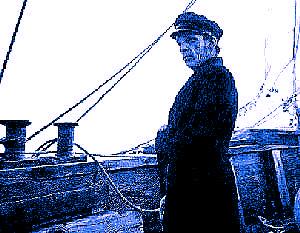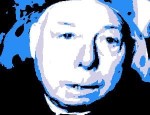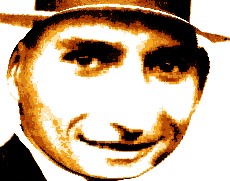Film Review
In his most ambitious and arguably most substantial film to date
director Philippe Ramos throws caution to the wind and attempts to shed
some light on Capitain Achab, the ill-fated hero of Herman Melville's
classic novel
Moby Dick. Rather than slavishly adapt
Melville's book, Ramos plots a more hazardous course and instead
invents a back story for Achab, concentrating on his childhood and the
period between losing his leg and his fateful confrontation with the
great white whale. The most significant part of Achab's life -
the period where he acquired his reputation as a legendary whale hunter
- is dealt with in a few terse sentences. If only Ramos had shown
similar restraint over the part of Achab's life-story that we already know about (his
meeting with Moby Dick) the film would probably have stood up much
better. Far from feeling sympathy for Achab as he is lured
helplessly to his cut-price death (on a piece of tow rope), it is a
struggle not to burst out laughing.
The film's tragically laughable tragic denouement aside,
Capitaine Achab is an arresting
piece of cinema that goes someway to elucidating the mystery of
Melville's most enigmatic creation. Admittedly, the first few
chapters of the story owe far more to Mark Twain than Herman Melville,
but the art design, choice of locations and cinematographic style
achieve an authentic reconstruction of the setting and the era in which
Achab existed, whilst the characters are convincingly portrayed by a
well-selected cast. The picturesque location sequences and score
bring a striking lyricism which is more effective in telling the story
than the seemingly interminable (and slightly grating) voiceover narration.
With its austere design and stark visual poetry, the film does have a distinctly Melville-esque feel to it.
Of the five chapters into which the film is divided (each dealing with
a signifcant character in Achab's life), the most memorable is the one
in which Achab (skilfully played by Denis Lavant) is nursed back to
health by his lover-to-be, Anna (Dominique Blanc), after losing his
leg. There is a genuinely tragic poignancy to Anna's inability to
cure Achab of his fatal affinity for the sea, and it is probably fair
to say this is the only part of the film which gets anywhere near to
unravelling Achab's complex psychology. If only the film had
stopped with the heartbreaking scene where Anna is deserted by the man
she has come to love... Not only would we have been spared the
embarrassing final segment (which tells us nothing we didn't already know) but we would
have been more encouraged to revisit Melville's great novel and pick up
the story where Ramos left off. As it is, the sorry sight
of Achab being dragged screaming into a mediocre piece of CGI is not
one that serves the cause of American literature particularly well.
After this whale of a film, Philippe Ramos would go on to direct
a substantial period piece about Joan of Arc,
Jeanne captive (2011),
and then his stangest film yet, one in which a country priest loses his head (literally)
for the love of a woman -
Fou d'amour (2015).
© James Travers 2010
The above content is owned by frenchfilms.org and must not be copied.
Film Synopsis
Captain Achab is the most famous seaman of the 19th century, but who exactly
was he and why do we remember him? Five people who knew him well conjure
up their memories of this great man - his father, his aunt, a priest, a sailor
and his beloved Anna. Each recalls a significant period in the life
of Captain Achab, whose destiny it was to take command of a whaling vessel
and pursue the great white whale Moby Dick. It would be a fight to
the death between two fearless titans of the sea...
© James Travers
The above content is owned by frenchfilms.org and must not be copied.



